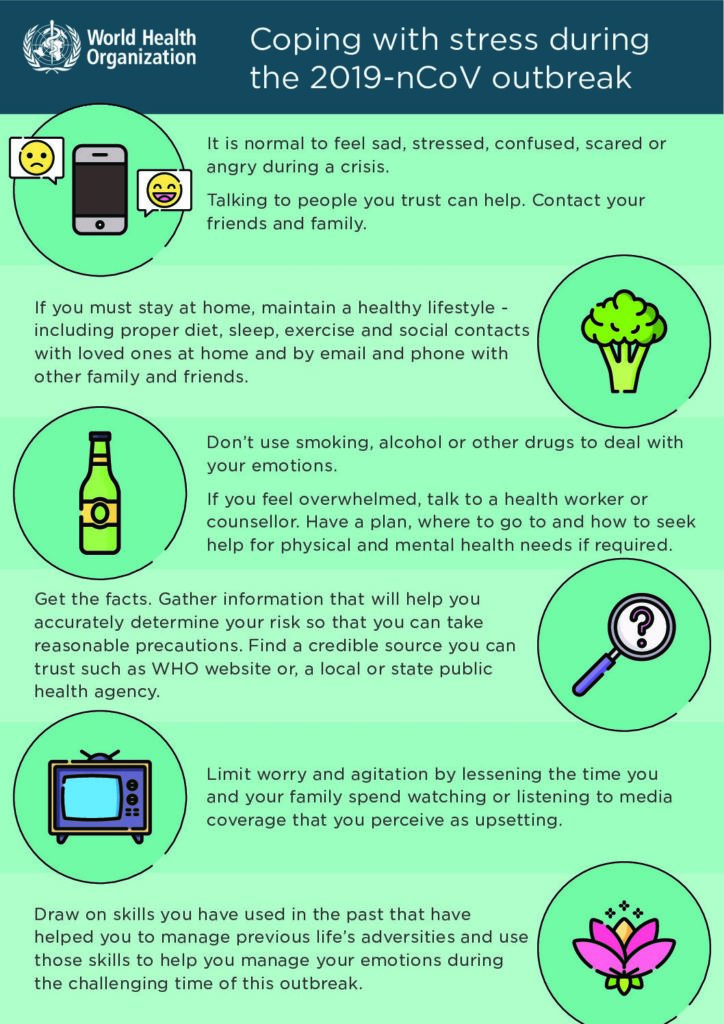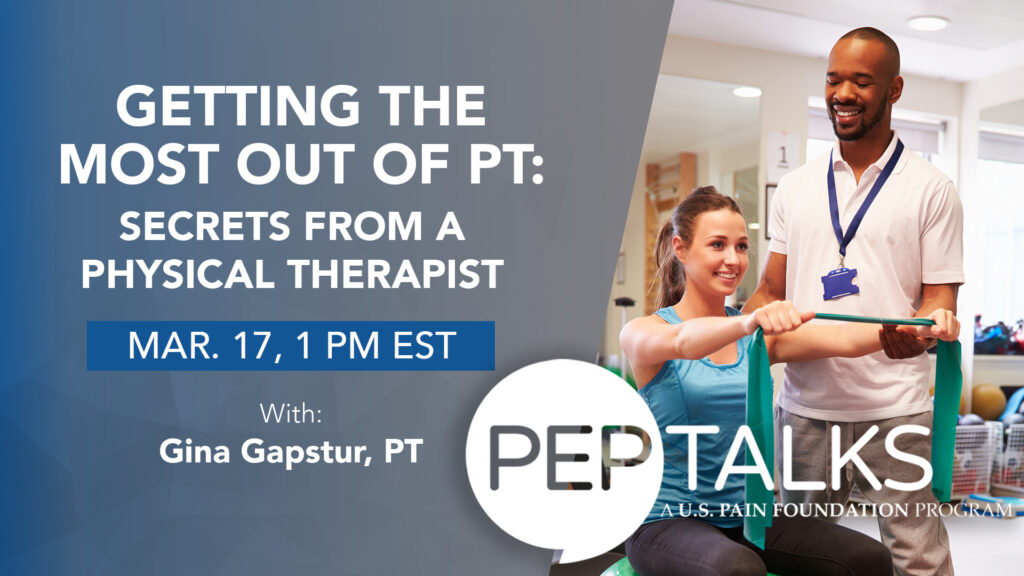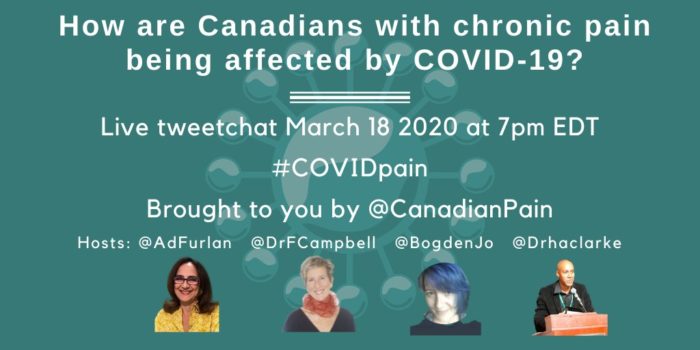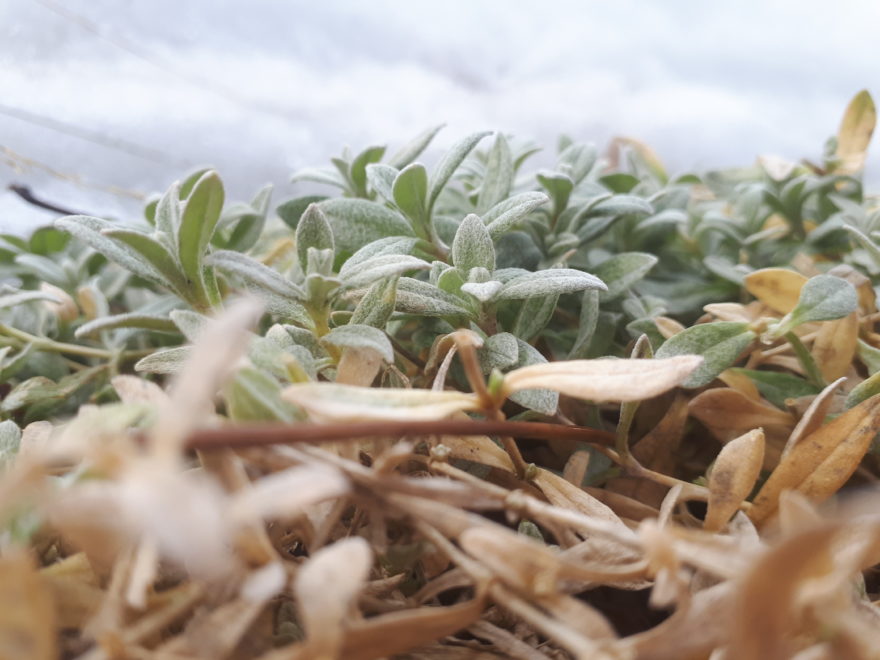Have you heard that ‘social distancing’ is really important, to avoid contracting COVID-19? Or spreading it to your loved ones? In plain English, this means that each of us should keep away from other people as much as possible – even if they don’t seem to be ill.
“It is important at all times to maintain distance between individuals, avoid direct contacts and abide by the usual rules of hygiene when you cough or sneeze”.(1) Those rules of hygiene are to cough or sneeze into your elbow or a tissue, and then safely dispose of the tissue.
It can be challenging to find ourselves with fewer choices of activities than usual, so I thought it would be helpful to create a list of free online – at a distance – events, courses, and workshops that might be interesting for many chronic pain patients.
There are actually quite a few of these resources available, so feel free to take the time to browse through the list below. Some of the ‘distant activities’ that I’ve included are only tangentially – indirectly – related to pain conditions.
These include some of the free online courses that I’ve taken, or for which I’ve registered, on the FutureLearn platform. Like the one I took last year on nutrition, because I had wanted to switch to a more anti-inflammatory diet ‘-)
To make it easier to decide which – if any – most interest you, I’ve included details on the number of hours of expected work per work (for multi-week courses), and start dates. In terms of dates, I’ve listed the events in chronological order.
There are even two live events this week! One tomorrow and one on Wednesday ‘-) There are also, at the bottom of the list, some online courses that look very interesting but don’t yet have new launch dates; for these, you can sign up to receive an email once the course dates are confirmed.
Before getting to my list of at-a-distance suggestions, though, let’s look at why social distancing suddenly became so important. It’s because we now know that a person can have COVID-19, and be contagious, for several days before they start to experience any symptoms.
It’s not enough to keep your distance only from people who’re already ill, we each need to keep our distance from as many people as possible. For our own sake, and for theirs as well.
This concept of social distance is particularly important for people with compromised immune systems. Did you know that many of us living, with chronic pain conditions, also have immune system issues? Research has shown (I’ve added emphasis):
that persistent pain is associated with broad and highly organized organism-wide changes in DNA methylation, including two critical biological systems: the central nervous and immune systems…
also provides a possible mechanistic explanation for commonly observed comorbidities observed in chronic pain (i.e. anxiety, depression).
Finally, the sheer magnitude of the impact of chronic pain, particularly in the prefrontal cortex, illustrates the profound impact that living with chronic pain exerts on an individual.”(2)
How does that all work, exactly? The process may be vary from one pain condition to another, so let’s take my own rare disease – a persistent pain condition – as an example. Complex Regional Pain Syndrome (CRPS) has been definitively shown, in multiple research studies, to wreak havoc with the body’s inflammatory and immune systems:
CRPS also affects the immune system.
High levels of inflammatory chemicals (cytokines) have been found in the tissues of people with CRPS.
These contribute to the redness, swelling, and warmth reported by many patients.
CRPS is more common in individuals with other inflammatory and autoimmune conditions such as asthma.”(3)
A compromised immune system puts many of us in the higher-risk category for COVID-19, in that we’re more likely to have more severe symptoms if we do contract this coronavirus. That’s why it makes sense for us to be more careful – with hand hygiene, social distancing, and any other recommended measures – than the ‘average Joanne or Joe’.
This is an opportunity to be proactive in helping ourselves, which also means protecting those around us ‘-) What social distancing doesn’t mean, though, is that we should all hole up in our homes and live in fear.
It’s important to feel connected to others, even at a distance, and to keep busy. The World Health Organization has some fantastic advice, for “Coping with stress”(4) during this pandemic. Or during any difficult period, really. My favourite tip on their infographic about this is to:
Draw on skills you have used in the past that have helped you to manage previous life’s adversities and use those skills to help you manage your emotions during the challenging time of this outbreak.”(4)

Well, those of us living with chronic pain certainly know how to manage “life’s adversities”, right?! So let’s put those skills to good use, and set an example for other patients – along with people who are healthy. Instead of focusing on what we can’t do because of social distancing, let’s focus on the opportunity to:
- catch up with family and friends by email, phone, text, or video
- complete your tax return (in many areas, this is due very soon!)
- do some spring cleaning, bit by bit over the next few weeks
- find some fun adapted exercises that you can do at home; your physical therapist or physician may have some suggestions based on your specific condition. Canadian pain specialist physician Dr. Andrea Furlan has created some exercise videos on YouTube, specifically for people with low back pain (https://youtu.be/kC1heBdhMFo) and neck pain (https://youtu.be/ZFHO93uzc4A)
- go for long walks outside, or more frequent short walks, depending on your physical abilities
- read any books you put aside for ‘when I have time’
- spend some extra time on a hobby, or learning a new skill
- take the time to rest and recharge
- zzzzzz take an occasional catnap at lunchtime; if you’re now suddenly working from home and have kids at home with you, try to institute a ‘quite time’ – for your benefit as much as for theirs!
- do any of the multitude of things we say that we don’t have time for…
As a starting point, and as a source of ideas for you, here’s the list that I’ve put together of free online events, courses, and workshops specifically for chronic pain patients. I am not endorsing any of them, but have verified that they’re from reputable sources.
I’ll update this post with other activities as I find them. And please feel free to send me information about other events, via Instagram or Twitter, and I’ll add them here ‘-)
I wish you not only health and safety during this pandemic period, but also calmness and serenity to deal with the uncertainty and worry that it causes. I’m sending you an online hug, in full compliance with social distancing recommendations!!!
Live online events this week
17 March 2020, 13:00-14:00 ET, for all pain patients
*Registration required
Live webinar: “Getting the most out of PT: Secrets from a physical therapist“
Hosted by the US Pain Foundation
Register at: https://register.gotowebinar.com/register/4677030399849463309

18 March 2020, 1900-2000 ET, for Canadian pain patients:
Live tweetchat: “How are Canadians with chronic pain being affected by COVID19?”, over on Twitter
Hosted by the Canadian Pain Society
On Twitter, just follow & use the hashtag #COVIDpain

19 March 2020, 2000-2100 ET, for people living with persistent pain:
*Registration required
Live webinar: “Coping with COVID-19: Stress reduction and self-care strategies“
“Gwenn Herman, LCSW, DCSW, a licensed social worker and clinical director of U.S. Pain’s support group network, will lead a guided meditation and discuss some stress reduction and self-care strategies in times of crisis.”
Hosted by the US Pain Foundation
Register at: https://register.gotowebinar.com/register/1470235468446207755
Twitter chats
There are many weekly or bi-weekly tweetchats in which I participate, over on Twitter. They usually last an hour. You can search for topics that interest you by using your search engine, e.g. “Twitter + chat + chronic pain”. To give you some ideas, here are three on-line chats which I regularly join:
1. Every Tuesday, 2030-2130 ET, #HCLDR “is a strong and vibrant online community of people who all share a passion for improving healthcare – through technology, processes and education. Our community includes patients, physicians, nurses, CEOs, IT folks, caregivers, policy makers and students from countries such as Canada, USA, Philippines, Ireland, Australia, New Zealand, Singapore, UK and South Africa.” Details:
https://hcldr.wordpress.com/
2. On Saturday mornings ET, or Friday evening for the hosts in the Philippines, there’s the #HealthXPh chat. A “collaborative effort by healthcare stakeholders, to discuss and use emerging technologies and social media to positively impact” healthcare. Information:
www.healthxph.org
3. Every other Friday, there’s an Empowered Patient Chat (#patientchat), at 1300 ET or 1000 PT. “During the chat patients and advocates come to learn from each other and discuss topics of interest to empowered patients.” The March 20 topic is “Cyber Hygiene: What Is It and Why Does It Matter?”: Visit:
https://powerfulpatients.org
Other at-a-distance activities
Started 02 March 2020, but you can still join in!
Free at-your-own-pace online course; approximately 6 hours/week for 6 weeks
“Demystifying Mindfulness – Discover the science of mindfulness, learn how it works and why, from a political, psychological, and philosophical perspective”
Provided by FutureLearn, developed by Leiden University
https://www.futurelearn.com/courses/de-mystifying-mindfulness
Started 08 March 2020, but you can still join in!
Personal note: I took this course last year, and really enjoyed it ‘-)
Free at-your-own-pace online course; approximately 4 hours/week for 3 weeks
“Food as Medicine – Intrigued by the connection between food and health? Discover nutrition science and explore the facts of using food as medicine”
Provided by FutureLearn, developed by Monash University
https://www.futurelearn.com/courses/food-as-medicine
Anytime – A very short article to read
It was published today in The Washingtonian; “7 Meditation Tips to Help Combat Covid-19 Anxiety”. Are you “Battling feelings of cabin fever, stress, and fear? Two DC-area yoga instructors have a few ideas that could help.”
https://www.washingtonian.com/2020/03/16/7-meditation-tips-to-help-combat-covid-19-anxiety/
23 March 2020, course begins
Free at-your-own-pace online course; approximately 3 hours/week for 6 weeks
“Psychology and Mental Health – Beyond Nature and Nurture: Learn how a psychological understanding of our emotions and behaviour gives us new ways to improve mental health and wellbeing”
Provided by FutureLearn, developed by the University of Liverpool
https://www.futurelearn.com/courses/mental-health-and-well-being
26 April 2020, course begins
Free at-your-own-pace online course; approximately 3 hours/week for 6 weeks
“Health and Wellbeing in the Ancient World – Use literary and archaeological evidence to see how ancient Greeks and Romans approached health, well-being and societal issues”
Provided by FutureLearn, developed by the Open University
https://www.futurelearn.com/courses/ancient-health
10 May 2020, course begins
Free at-your-own-pace online course; approximately 3 hours/week for 3 weeks
“Digital Wellbeing – Do digital technologies affect our wellbeing? Explore the concepts of health, relationships and society in the digital age”
Provided by FutureLearn, developed by the University of York
https://www.futurelearn.com/courses/digital-wellbeing
31 May 2020, course begins
Free at-your-own-pace online course; approximately 3 hours/week for 3 weeks
“What is Health Research? – Explore the world of health research and the role volunteers play in transforming treatments and improving health care”
Provided by FutureLearn, developed by the University of Leeds and the (UK) National Institute for Health Research (NIHR)
https://www.futurelearn.com/courses/what-is-health-research
07 June 2020, course begins
Free at-your-own-pace online course; approximately 3 hours/week for 3 weeks
“The Musculoskeletal System: The Science of Staying Active into Old Age – Demystify the ageing process and learn how our everyday behaviours are likely to affect our long-term musculoskeletal health”
Provided by FutureLearn, developed by the MRC-Arthritis Research UK Centre for Integrated research into Musculoskeletal Ageing, a collaboration between the Universities of Liverpool, Sheffield and Newcastle.
https://www.futurelearn.com/courses/musculoskeletal
Anytime, available in many different languages
Free at-your-own-pace online training: “Learn a science based approach to overcome chronic pain”
Provided by the Retrain Pain Foundation
A series of one-minute slide-deck style modules, on a variety of topics
https://www.retrainpain.org/
Anytime
The US Pain Foundation has a number of free pre-recorded online webinars, for people living with persistent pain, available on their website.
These include the workshop in which I participated back in October, on the use of metaphor in writing about pain.
Some of the topics are only applicable to Americans (e.g. Financial and employment issues; or Insurance and access issues), but there are many others which could be useful no matter where you live: Advocacy; Awareness; Mental health and social support; Pain management…
Visit: https://uspainfoundation.org/webinars/
Online courses to come
Free at-your-own-pace online course; approximately 3 hours/week for 4 weeks
“Maintaining a Mindful Life – Learn how to apply mindfulness techniques, so you can improve your communication, relationships and emotional health”
Provided by FutureLearn, developed by Monash University
https://www.futurelearn.com/courses/mindfulness-life
Free at-your-own-pace online course; approximately 3 hours/week for 4 weeks
“Nutrition and Wellbeing – Demystify the complex and conflicting messages we hear about nutrition, health and lifestyle today, on this free nutrition course”
Provided by FutureLearn, developed by the University of Aberdeen
https://www.futurelearn.com/courses/nutrition-wellbeing
References
(1) Gouvernement du Québec (Quebec Government). Coronavirus (COVID-19).
Online. Accessed 16 Mar 2020:
https://www.quebec.ca/en/health/health-issues/a-z/2019-coronavirus/#c46341
(2) Renaud Massart, Sergiy Dymov, Magali Millecamps, Matthew Suderman, Stephanie Gregoire, Kevin Koenigs, Sebastian Alvarado, Maral Tajerian, Laura S. Stone, Moshe Szyf. Overlapping signatures of chronic pain in the DNA methylation landscape of prefrontal cortex and peripheral T cells. Scientific Reports, 2016; 6: 19615. DOI: 10.1038/srep19615. Accessed 16 Mar 2020:
https://www.nature.com/articles/srep19615
(3) U.S. Department of Health and Human Services (HHS). National Institute of Neurological Disorders and Stroke (NINDS); National Institutes of Health (NIH). Complex Regional Pain Syndrome Fact Sheet. 13 Mar 2020 (update). Online. Accessed 16 Mar 2020:
https://www.ninds.nih.gov/Disorders/Patient-Caregiver-Education/Fact-Sheets/Complex-Regional-Pain-Syndrome-Fact-Sheet
(4) World Health Organization. Coping with stress during the 2019-nCoV outbreak. Coronavirus disease (COVID-19) advice for the public. Online. Accessed 16 Mar 2020:
https://www.who.int/emergencies/diseases/novel-coronavirus-2019/advice-for-public

